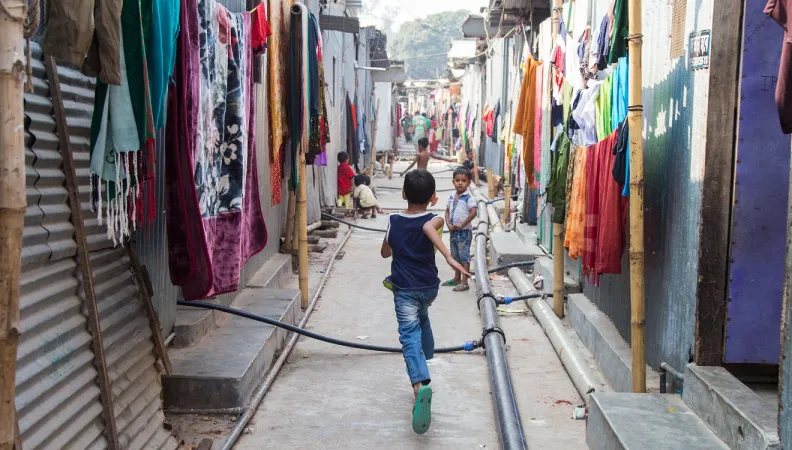Share the page
World Urban Forum: Housing is a Key Component to the Achievement of the Sustainable Development Goals
Published on

Agence Française de Développement will be at the 12th edition of the World Urban Forum in Cairo, Egypt, from 4 to 8 November. This forum is organized by UN-Habitat, the United Nations agency mandated to promote sustainable cities and urban development. On this occasion, Audrey Guiral-Naepels, Head of AFD’s Urban Development Division, tells us about the development issues involved in housing and AFD’s action in this field.
The World Urban Forum (WUF) will be held in Cairo from 4 to 8 November 2024. What issues will be addressed at this event?
Audrey Guiral-Naepels: It’s the first World Urban Forum to be held in Africa for more than 20 years, meaning that many partners in the region will be present. It will be an opportunity to highlight this major issue for Africa, as well as the crucial role of cities in the climate transition. Indeed, cities account for two-thirds of greenhouse gas emissions and energy consumption, and they are particularly vulnerable to climate change. In Africa, this climate vulnerability is exacerbated by social factors, such as the substantial number of informal neighborhoods where residents often settle in hazard-prone areas, making them especially vulnerable.
Yet cities also hold the key to an array of solutions for climate action and adaptation. For example, urban greening, such as planting trees, can directly contribute to reducing temperatures. In Tamale, in Ghana, we’re working with the city on the preparation of an investment program for its adaptation to climate change, which aims to reduce vulnerability to flooding. AFD also takes action to reduce greenhouse gas emissions. In Togo, in Lomé, we’ve been supporting the entire strategy for the management and treatment of solid waste, which causes methane emissions, for more than ten years now. We also work on reducing urban congestion, which contributes to increasing CO2. So, this World Urban Forum is an opportunity for AFD to present these solutions, including through the Cities and Climate in Africa (CICLIA) project, which helps cities develop their planning and investment projects with climate co-benefits. Thirty cities have already benefited from this initiative.
What theme does AFD wish to address during the forum?
A. G.-N.: This forum will be an opportunity to take part in the mobilization on the issue of access to housing. The global housing gap is currently estimated at more than 330 million households, without counting the substantial number of dwellings in need of renovation, especially in terms of energy. The construction industry, which is one of the largest emitters of greenhouse gases, must contribute to efforts to reduce emissions by 2050.
It's essential to fully understand local needs, such as the location and type of housing, and the financial capacity of households, so that we can define appropriate housing policies. Africa faces another challenge: its construction industry is very limited, meaning there is a very low supply of formal services. In Cameroon and Nigeria, less than 10% of housing production is formal.
AFD is calling for global and collective mobilization on the issue of housing. The objective is to build confidence among the stakeholders, so that the private sector can play its part. The aim is also to define solid public policies, clear regulatory frameworks, and robust financing schemes.
At the global level, it’s also vital to promote access to land. The land needs to be well located, close to centers of activity, to avoid creating monofunctional neighborhoods with only housing, far from jobs and services. This could lead to people abandoning these neighborhoods and returning to live in informal housing. We’ve already seen this happening in Latin America.
What action is AFD taking for housing today?
A. G.-N.: Housing is one of our traditional sectors of operation. Over the last ten years, we’ve committed €2 billion in this sector, including €1 billion in foreign countries. We’re working to structure national public policies and develop them in cities, assist housing banks, and support private construction operators and NGOs in the sector, as well as energy efficiency in buildings and student housing. It’s a multi-dimensional sector which mobilizes an array of expertise at AFD.
We launched the Sustainable Housing Initiative (SHI) two years ago. Many countries want to engage in ambitious housing policies, but face difficulties in terms of investment, control over land, and the consideration of energy efficiency issues. The SHI is a facility that helps governments and local authorities launch studies and analyses, for example, on the needs, the real estate market, the regulatory framework, and the way in which it can be developed to trigger a dynamic for the production of affordable housing. This technical assistance supports the various public and private stakeholders in the housing chain at the national and local levels. The SHI was launched by AFD, but it is based on partnerships: NGOs, researchers, French regional and local authorities, and international donors are all members of a committee which enables us to inform the thinking.
This initiative is currently being deployed in eight countries, including Kenya, Uganda and Rwanda. In Kigali (Rwanda), we’re helping the city improve precarious neighborhoods through a loan and a grant from the European Union. The city wants to make sure that their residents are not forced to leave the regenerated neighborhoods and live in new slums. So, it wants to work on the issue of affordable housing. We’re working on this through the SHI to help it explore two potential options: firstly, self-help housing and the extension of existing housing and, secondly, the construction of new affordable housing units. The city’s aim is to encourage private owners to add value to their property, while undertaking to house people on low incomes. At the same time, it wants to build new high-quality housing for these people. We’re still in the study phase and the project will only start in late 2024. But it’s already one of our most innovative so far in this field!
